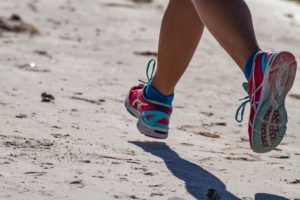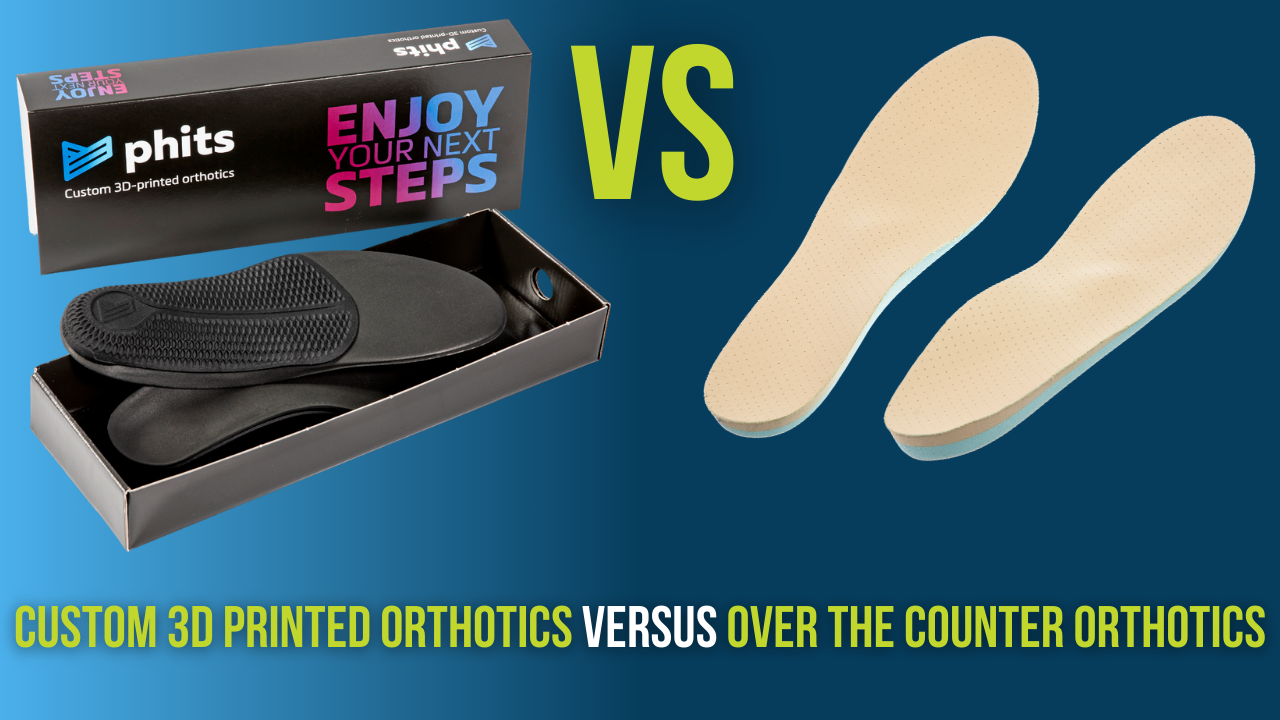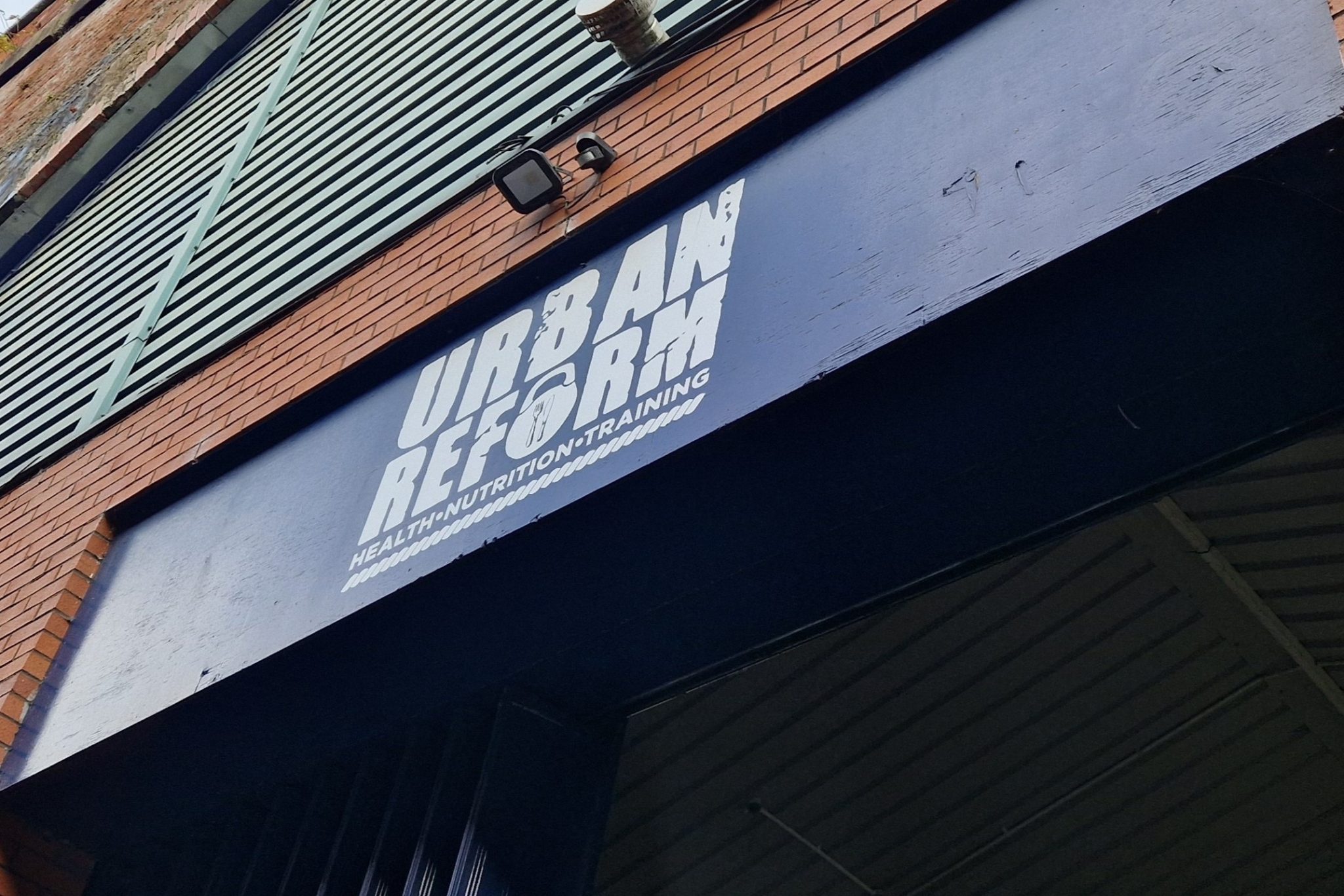What is it?
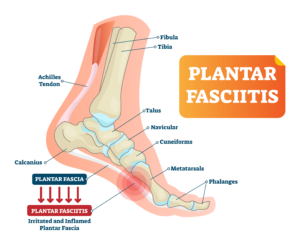 Plantar-fasciitis is the most common cause of heel pain in adults, with 1 in 10 experiencing it within their lifetime.
Plantar-fasciitis is the most common cause of heel pain in adults, with 1 in 10 experiencing it within their lifetime.
The plantar-fascia is a strong band of tissue that stretches from the heel bone (calcaneus) to the toes. Its role is to support the arch and to act as a shock absorber in the foot.
Plantar-fasciitis is a biomechanical overuse condition resulting in degenerative changes at its attachment to the calcaneus.
Plantar-fasciitis usually presents with a gradual onset of pain. Sufferers can feel a sharp stabbing pain or deep ache in the heel or along the arch of the foot. Another sign can be the morning hobble. Pain is noticeable when taking first steps in the morning. Heel pain can worsen after periods of rest for example standing after a period of sitting at a desk.
Risk factors for developing Plantar-fasciitis in non-athletes include:
– Age group; Plantar-fasciitis is most common between the ages of 40-60
– Limited dorsiflexion (stretching your toes towards your shin)
– Foot mechanics such as flat feet
– Obesity
– Occupations that keep you on your feet
Running
Plantar-fasciitis is associated with a variety of sports but is mostly reported in recreational and elite runners. When running the plantar-fascia stretches and contracts, meaning the repetitive strain can lead to an overuse injury. In runners, Plantar-fasciitis may be linked to the foot strike or push off phase of running. In the athletic population, increased training volume has shown to be a risk factor. At Summit we offer a complete running analysis for our clients including GAIT analysis, treadmill running assessment and balance testing. From here one of our practitioners uses this data to put a personalised plan in place to correct your form and help you to stay injury free. You can also read our detailed blog and review on this service.
Load and Capacity
Imagine a weighing scale with load on one side and capacity on the other. Overuse injuries happen because  there is an imbalance between the load and capacity of the tissue. For example, an increase in load could be a runner completing more mileage or a person starting a new job with increased standing time. If a person’s load has not changed this can indicate a reduction in tissue capacity. Tissue capacity changes can be influenced by factors such as stress, increase in age or changes in hormone levels.
there is an imbalance between the load and capacity of the tissue. For example, an increase in load could be a runner completing more mileage or a person starting a new job with increased standing time. If a person’s load has not changed this can indicate a reduction in tissue capacity. Tissue capacity changes can be influenced by factors such as stress, increase in age or changes in hormone levels.
Treatment
Plantar-fasciitis is a self-limiting condition and the length of symptoms will depend on the patient. Within the literature, it is suggested that plantar-fasciitis should resolve within 3-6 months. However, in patients who cannot avoid aggravating the plantar-fascia with prolonged periods of standing it may take up to 9 months to improve. There is a multitude of services we offer at Summit to treat plantar-fasciitis…
Load Management
Since the foot is constantly under pressure from standing and walking, the pain may persist if nothing is done to correct the situation.
First steps of treatment begin with load management, this is key!
A runner can continue to run as long as the pain is at a tolerable level and does not become worse. The pain should also return to a normal level by the next day. If running causes too much pain you may be advised to start with walking or jogging as an alternative.
Stretching & Strengthening
Summit can provide stretches that not only target the plantar-fascia but also target the calf muscle. The plantar-fascia can be stretched in a non-weight bearing position with ankle dorsiflexion and big toe extension. One of our therapists will determine the use of stretching dependent on the irritability.
Strengthening exercises have been shown to be an important part of the rehabilitation process. Plantar heel pain is similar to tendinopathy in that it responds well to heavy loading. Loading strengthens the foot muscles, the plantar-fascia and other connective tissue.
Shockwave Therapy
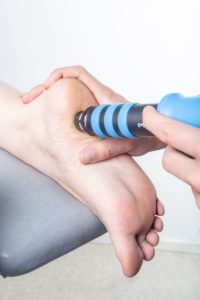 Refractory plantar-fasciitis is when there has not been a response to conventional treatment. At Summit we offer Shockwave Therapy; this is a quick and non-invasive procedure were shockwaves are passed through the skin to the injured area of the foot, using a special device. The shockwaves are audible, high energy soundwaves. This treatment has been shown to increase blood circulation and activity in the cells in the treatment area, which in turn speeds up the body’s own healing process. The nerves can also be overstimulated by the shockwave, which leads to reduced pain sensation. We have seen hugely great results in clients who have had a course of shockwave therapy with Summit and the feedback has been hugely positive.
Refractory plantar-fasciitis is when there has not been a response to conventional treatment. At Summit we offer Shockwave Therapy; this is a quick and non-invasive procedure were shockwaves are passed through the skin to the injured area of the foot, using a special device. The shockwaves are audible, high energy soundwaves. This treatment has been shown to increase blood circulation and activity in the cells in the treatment area, which in turn speeds up the body’s own healing process. The nerves can also be overstimulated by the shockwave, which leads to reduced pain sensation. We have seen hugely great results in clients who have had a course of shockwave therapy with Summit and the feedback has been hugely positive.
Custom Orthotics
Orthotics are commonly used for the management of plantar-fasciitis. To reduce loading of the plantar fascia 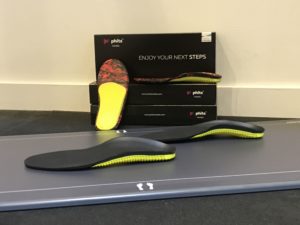 when weight bearing, orthotics helps by holding up the medial arch of the foot and reducing foot pronation. At Summit we offer a Footscan service, by using state of the art GAIT analysis we are provided with bespoke data about your personal dynamics. Evidence based algorithms then translate the data to help us with the design of your custom 3D printed Phits orthotics.
when weight bearing, orthotics helps by holding up the medial arch of the foot and reducing foot pronation. At Summit we offer a Footscan service, by using state of the art GAIT analysis we are provided with bespoke data about your personal dynamics. Evidence based algorithms then translate the data to help us with the design of your custom 3D printed Phits orthotics.
So, what’s the best foot forward?
If you feel you have any of the symptoms described and would like to seek further advice, our team are more than happy to discuss this with you and advise the best course of treatment for your needs.
Call us on 0800 731 2738 or book an appointment online today!
Get in touch here and speak to a member of the Summit team!
You can also follow us on Facebook, Instagram & LinkedIn to keep up to date.

